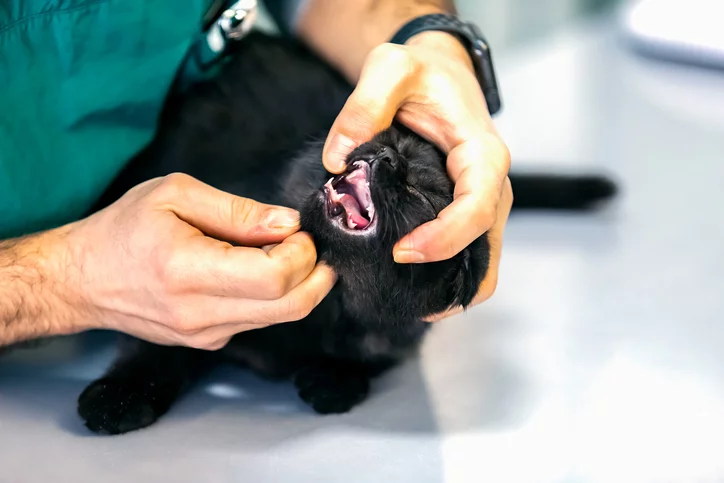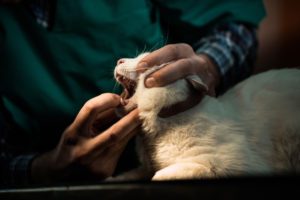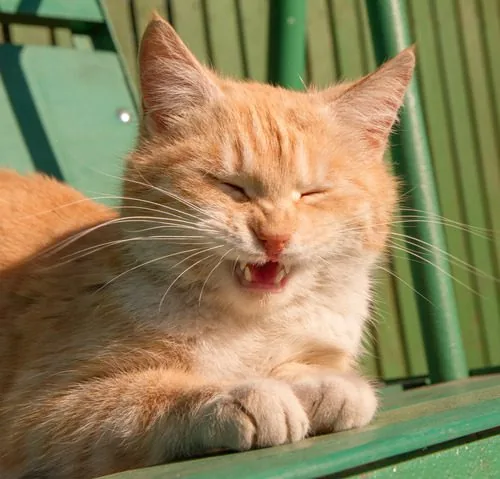Stomatitis in Cats: Symptoms & Treatment
Your beloved feline has started acting funny, pawing at her face and shaking her head when she eats. You look in her mouth, but don’t see anything. At this point you wonder if you should take her to the veterinarian’s office. Yes, you absolutely should. Your cat might be suffering from a condition called stomatitis.
What is Stomatitis?
Stomatitis is a condition affecting the mouth and the area inside the mouth. It is a type of inflammatory infection. Studies have linked the disease to a biological reaction within the cat’s immune system that attacks the bacteria in the cat’s mouth and thereby causes pain and swelling.
This means the immune system, which should be protecting the animal from harm, actually causes the problem. A general explanation of the disease is that normal oral bacteria on the gums and teeth angers the immune system and this causes physical damage to the affected area.
Even if your cat develops this condition, don’t be alarmed. This is a common condition in cats and dogs, and can be treated and maintained with proper veterinary treatment which may include medication or dental care.

Symptoms of Stomatitis in Cats
Stomatitis in cats can cause different levels of inflammation and pain, therefore symptoms can widely vary depending on the severity of the infection. Having trouble eating or shaking the head while eating are the first signs most commonly noticed by pet owners. Another noticeable symptom is a lack of self-grooming. Cats may stop cleaning themselves because it is so painful to do.
Other symptoms can include swollen or discolored lips or gums, bleeding gums, and swelling of the area around the mouth. Excessive drooling and failure to lap up water can be indicative of stomatitis. Pawing at the face or mouth is another symptom some cats exhibit.
In extreme cases, the face may be visibly swollen or the tongue may protrude constantly from the mouth. Looking into your cat’s mouth, you might notice lesions on the roof of the mouth or the inside of the cheeks. In some cats, the nose will also become swollen or discolored.
Long-term Health Effects
Left untreated, stomatitis can lead to severe health problems. Cats may refuse to eat because of the pain associated with the disease. This can lead to extreme, sudden weight loss.
Failure to lap up water can cause severe dehydration, which can lead to many other problems, including death.
As in humans with periodontal disease, untreated stomatitis in cats can spread into the throat, nasal cavities, and bloodstream. The risk to internal organs is serious and can include heart disease, liver failure, and kidney failure. The only way to determine if damage has occurred to vital organs is through a comprehensive medical examination and blood testing by your pet’s veterinarian.

Treatment Plans
If the inflammation is causing your pet distress, the veterinarian will concentrate first on pain management. This can include medications to make the pet more comfortable. The second step will be to treat the infection and heal the lesions. This will include oral or intravenous antibiotic treatment over a course of 7-10 days. Once the infection is removed, a treatment and maintenance plan will be developed.
Because the exact cause of stomatitis is not known, it is impossible to completely eliminate it if your cat is one of those affected. The best way to treat the disease is to treat the underlying cause-the bacteria on the teeth and in the gums.
Dental cleaning is effective in removing harmful bacteria from the surfaces of the teeth. During a dental cleaning, your pet will be lightly sedated and an ultrasonic scaler will be used to remove plaque and calculus buildup on teeth and along the gumline. This is similar to the teeth cleaning procedure your dentist uses when you go in for your annual cleaning.
In some instances, removal of the affected teeth might be necessary. In extreme circumstances, the veterinarian might recommend removing all the teeth and switching the cat to a soft diet for the remainder of life.
To maintain good oral health, a special dental care diet may be prescribed. This high quality pet food is manufactured by Hills, Purina Pro-Plan, and Royal Canin, as well as others. The food will be available for purchase through your veterinarian’s office.
If blood tests reveal that any kidney or liver damage has occurred as a result of the stomatitis, additional medications and treatments may be needed in the future.
Once the active stomatitis has been treated and your cat is comfortable and back to normal, the veterinarian will schedule future, periodic dental cleanings and exams to help prevent the condition from returning. In some cases, the stomatitis may reoccur and affect previously healthy tissues. That is why continual veterinary care is necessary.
Are Certain Breeds More Likely to Develop Stomatitis?
While all cats and dogs can contract the disease, certain purebred cats seem to be more susceptible. Siamese, Persian, Abyssinian, and other breeds that have originated through crossbreeding and inbreeding may carry a trait that causes the disease to affect them more than other breeds. This may be linked to a genetic anomaly that occurs in only a few cats. Further studies will be needed to determine the exact link between the species breed and the disease.
Stomatitis and a Long Lifespan
As stated above, stomatitis is a condition that affects about ten percent of the feline population. While there is no known cure for the disease, proper treatment and future attention to dental hygiene will help manage the disease.
It might be necessary to change your pet’s lifestyle, diet, or medications; but your cat can have a long, happy life if you and your veterinarian are proactive in treating stomatitis. It is only when left untreated for long periods of time that the disease can attack vital organs or cause starvation and dehydration, both of which can lead to the death of a pet.
If you have any questions about your cat’s health, call us today at (630) 759-0093. Here at Boughton Square Animal Clinic, we are ready to help you and your pet with whatever you may need!
Recent Posts
6 Possible Causes for Your Cat’s Sneezing
6 Possible Causes for Your Cat’s Sneezing Cats are known for their curious and playful nature, but…
Why is My Dog Eating Grass?
Why is My Dog Eating Grass? Dogs are known for their curious behaviors, and one that often…
Can Dogs Eat Marshmallows?
Can Dogs Eat Marshmallows? Marshmallows are a popular treat for many people, but pet owners often wonder,…
Can Dogs Get Sunburn?
Can Dogs Get Sunburn? As summer approaches and the days get longer, many pet owners look forward…
Dog Dehydration: Symptoms, Treatment and Prevention
Dog Dehydration: Symptoms, Treatment and Prevention Dehydration in dogs is a common but often overlooked condition that…
About Boughton Square Animal Clinic
Since 1979, Boughton Square Animal Clinic has served Bolingbrook, IL and surrounding communities as both a veterinary care provider and a devoted partner in treating your animal family members for life.






